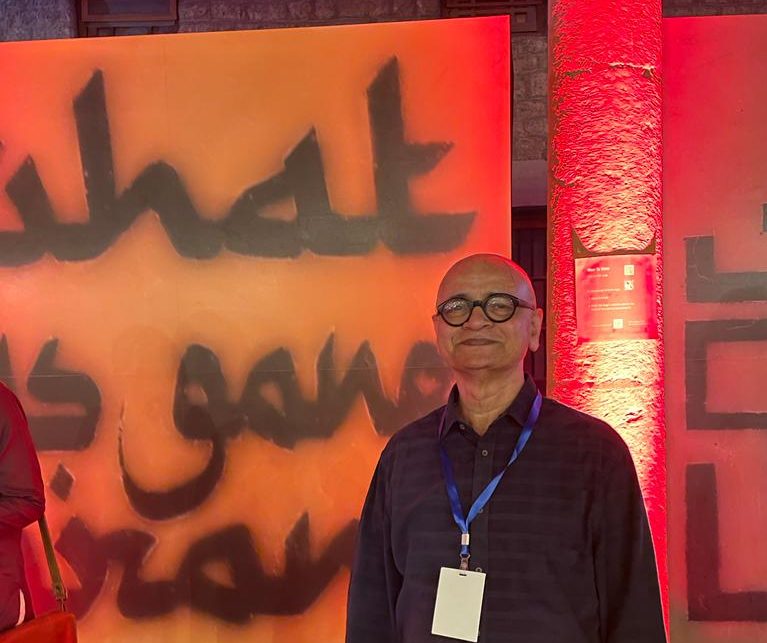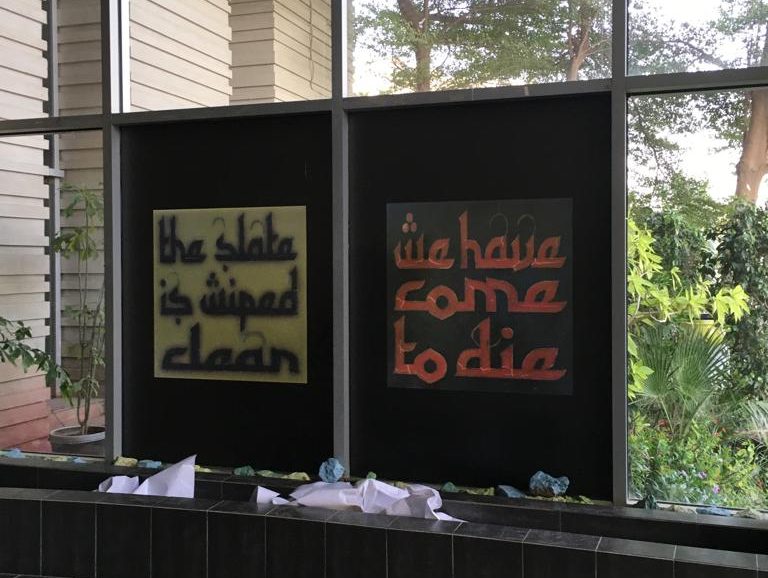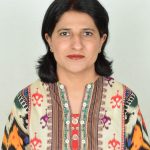The encaustic painting is more than 2000 years old art form; the use of wax mix in color pigments is a unique old tradition that always inspires me. I have seen encaustic paintings in museums, mainly painted on wooden or sometimes canvases but never seen encaustic on a wax surface.
Amin Rehman, a Canada-based artist graced the Karachi Biennale this year, held between October 31 to November 13, 2022, with his latest exhibition titled “Water Wars”, prior to discussing the content of the exhibition, I would like to tell the Avant Gard medium, Amin Rehman is using. Almost thirty years ago, he decided to experiment wax based tiles as a surface material of his art which is unique in itself, he gives a new dimension to encaustic painting by painting with color pigments mixed in wax on the surface made by wax; this is not the only uniqueness, he then takes his calligraphy to unimaginable heights. He detaches words from the human source and presents them as subjects.

As a researcher of the philosophy of communication, it is fascinating for me to see how he paints with words. Words spoken or written are always source dependent and cannot exist alone, they are always attached to someone or something and give meaning in that perspective, but Amin Rehman’s words are characters with emotions; they smile, they get angry, they seem worried at the time, cautions, agitated but they never seem looking for an owner who utters them. They (words) behave like living souls and communicate with the observer. The resuscitation of words independent of human beings is something that an Artist of his stature can do. An additional fascinating aspect of Amin’s work is again the Avant Gard font he invented, he draws feeling with letters, and letters sometimes look like the Roman alphabet and other times Arabic and Farsi Script. He mixes languages with expressions and English in an Arabic-Farsi font dyad is something extraordinary.
Amin Rehman is a bold Artist who experiments on every layer of his art; he uses the ancient idea of wax painting and takes it to new limits; he experiments with calligraphy and achieves what no artist has yet achieved, the use of letters and words in juxtaposition with figure and ground, he transforms his calligraphy and dilutes the binary opposition of east and west, but this is not all, there is much more to it; in his past exhibitions, he always selected a modern day art form to supplement his content and this time he mixes his authentic art with augmented reality. All wax tiles displaying different visual art using letters were then attached to the software and by a simple assimilation process, a documentary was available; look at the visual art with a phone, and a new dimension was there for the audience to explore.
I am not finished yet—Amin Rehman is a hard-core activist, and his art never serves the sole purpose of aesthetic pleasure; he surpasses all the challenges in this sphere as well by not going art for the art’s sake; on the contrary, he opts to touch the most sensitive chords of this capitalist society, but of course, aesthetically, his previous work highlighted the issue of forced labor, migration, conflicts and marginalization of powerless and the exhibition under discussion is educating about the most pressing matter of time, “water.”
Also Read: OIC congratulates Qatar on successful FIFA World Cup
He chooses his homeland as his content backdrop while living in Canada, though. Being a Pakistani diasporic, he always bridges the east and the west, he searches for elements that can communicate with each other, and his Farsi and Arabic-looking visual art, in fact, corresponds to the English language and discussing universal issues related to humanity, to the greater good.
‘Water Wars’ highlights that water is absolutely political and becoming more so through scarcity, national ownership, and boundaries. As the Indus River Delta increases, the Arabian Sea encroaches on the sweet water of the Indus River, which is, in turn, polluted by our sewerage. The Karez water system in Baluchistan is drying up. River Ravi in Lahore is choked with waste. There are water mafias in different parts of the country. Water Wars addresses the changing climate in the Indus River basin regions by 2040.

Amin’s work raises several sensitive questions and issues surrounding “water.” We remember all important civilizations were established on river banks or near water sources because water is life. History indicates that wars were fought to get hold of water sources or to protect them from pollution. The most known “war over water” in the 20th century is a series of confrontations between Israel and its Arab neighbors from November 1964 to May 1967 over control of water sources in the Jordan River drainage basin.
Political scientists believe the 21st century would be a century of “water Wars.” The whole world is working for safe, clean sweet drinking water, but in Pakistan, the situation is otherwise. We are ruining our natural resources, and Amin has expressed his pain over what he sees in his native country, from contamination of water in rivers, the dislocation of poor families due to the construction of dams, or due to drought. His visual art portrays the situation in Karachi, where the water mafia rules the water resources, and the provision of clean drinking water is only possible when you approach this mafia. He also shows how the Arabian sea salt water is contaminating the Sindh river and rainwater nullahs coming from Baluchistan.
His visual art exhibits that traditional water channels in Baluchistan, known as the “Karez Water System,” are being replaced with tube wells, and the harsh consequence are drought and famine.
Amin fears that early monsoons and exceptional rainfall will continuously result in floods and human displacement in Sindh as well as in Punjab.
Amin’s work also highlights what is happening with the agricultural lands of Punjab and Sindh, where the powerful land mafia is converting agricultural lands into housing colonies with the connivance of everybody that is in power. Amin’s work portrays a real but dreadful future that Pakistan will go through soon. His love for river Ravi that runs in Lahore is eternal and Amin, even living in Canada, cries through his work that what has been done with this beautiful and scenic river which is now just a drainage channel full of industrial and pharmaceutical waste.
About the author:

Writer Shazia Anwer Cheema is an author, columnist, and foreign affairs expert who writes for national and international media. She is a doctoral student and researcher in semiotics and philosophy of communication at Charles University in Prague. She can be reached at her: Twitter @ShaziaAnwerCh Email: shaziaanwer@yahoo.com
